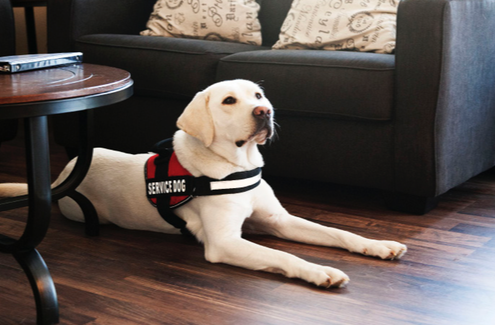Ushering In Animals On Campus With Open Arms

By Charlotte Hansen
Staff Writer
Emotional support animals and service dogs have been around for several years, but only recently has it become more popular at Lynn and at other universties around the world.
This past year saw seven registered animals on campus, and now there are 24. With different guidelines and restrictions for both service and emotional support animals, most students must abide by rule 2.1.8.6 of Lynn’s Community Code, which states that Lynn students can bring emotional support animals to campus. Most students can bring emotional support or service dogs/miniature horses on campus as long as they have a pre-existing medical condition.
Recently, Matthew Roche, the ADA Coordinator at the Institute of Acheivment and Learning, spoke about Lynn’s involvment with the growing number of service dogs and emotional support animals.
“An emotional support animal falls under the Fair Housing Act, not the American With Disabilites Act. Those dogs cannot go to class, the cafeteria, the library [or] any building except for their residence hall,” said Roche. “If you have a service dog, there are no real requirements becasue a service dog is specifically trained for a task associated with a disability.”
Before students can bring their pet on campus, there are significant amounts of paperwork involved to ensure validity, both from the student and the student’s doctor. According to Roche, a recommendation letter from the student’s doctor is essential, and it has to be on the physician’s official letterhead with the doctor’s medical license number.
Students also need to make sure that they are prepared to take care of the pet.
“Once I get that letter, I send a follow-up questionnaire to the treating physician that they are required to answer, giving us further details on their recommendation and seeing if it’s a really necessary accomodation,” Roche added.
“Last year we had seven registered, [this year] we have 24 now. It’s a big increase, and there are a lot of services that will write that initial letter without the doctor meeting with the student,” continued Roche. “There may not even be a need for it, but they’re meeting all the requirements that we need for the documentation.”
Once the paperwork is approved, it heavily depends on the animal and the student. If it is a service dog, students are allowed to keep them at their side at all times. If it is an emotional support animal, it will need to stay in the student’s room.
Roche and others have acknowledged marked growth in the past year. Without a doubt, students are loving the opportunity to have their pet on campus with them, seemingly providing an overall positive impact on the morale of community as well.



